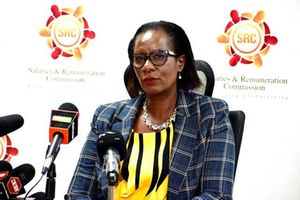Book Club: Avid Readers Forum

What you need to know:
- The last discussion we had was about the future of women's rights, and we were guided by Prof Sylvia Tamale's co-authored journal article mentioned above.
- The virtual discussion attracted more than 100 participants and we discussed a wide range of themes concerning women in Africa and Kenya, such as the developments surrounding the prohibition of female genital mutilation.
Name: Melissa Mungai, lawyer and master's student of human rights at the University of Pretoria.
Journal Reading: Why Women's Rights Are Indeed Human Rights: An African Perspective On International Feminism by Joe Oloka and Sylvia Tamale.
Most lawyers are ardent readers, although they are known to limit their reading content to legal texts. My library, however, has a good blend of legal stuff, philosophy and my treasured collection, African literature.
I am nomadic when it comes to book clubs. My interest in them came alive after I joined the organising team in the inaugural Macondo Literature Festival in 2019. The three-day festival brought together writers, storytellers, spoken word artists and filmmakers from Lusophone and Anglophone Africa. The African bias that pervaded the festival greatly inspired me.
Some of the book clubs that I have been part of are Text Book Centre Book Club and the Columbia Global Centres' virtual book talk series on African Literature. I attend the two depending on the book of the month. Luckily, most of the books we discuss have been written by authors who graced the Macondo Literature Festival like Peter Kimani and Yvonne Owuor. I am a committed member of The Hut and Avid Readers Forum, which are more legal-centric.
The Hut, and Avid Readers Forum, are not really book clubs, but they function the same way. We choose reading material, to be discussed either weekly or monthly. The Avid Readers Forum is run by senior lecturers and students at Kabarak Law School with the aim of promoting reading and intellectual discourse among students.
The last discussion we had was about the future of women's rights, and we were guided by Prof Sylvia Tamale's co-authored journal article mentioned above. The virtual discussion attracted more than 100 participants and we discussed a wide range of themes concerning women in Africa and Kenya, such as the developments surrounding the prohibition of female genital mutilation. We also talked about the challenges that teenage girls, elderly women, women with disabilities and women from marginalised communities face every day.
I encourage young lawyers to initiate or participate in book clubs because it broadens their worldly lenses on Africa's historical and current identity. For women in Africa, we know that our identities and experiences are often undermined, ignored or erased. Whenever we participate in these book clubs, we must always fearlessly emphasise women's positionality in the literature and subsequent discussions; lest we be invisibilised or muzzled.





